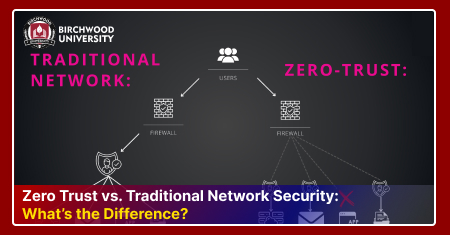Beyond the Basics: Exploring Specialized Tracks in Advanced Cyber Security Certifications
Feb 15, 2024Cyber Security acts like a guard securing our digital footprints from theft, damage, and illegal access to computers, networks, and data. There are more chances for cyber criminals to steal, cause harm, or cause disruptions as interconnections grow. The need for cyber security specialists has increased due to a significant increase in cyber crimes. The 2022 (ICS)2 Cybersecurity Workforce Study estimates that there will be a demand for cybersecurity experts worldwide that will surpass 3 million individuals. This blog will help you decide which certification is best for Cyber Security? So, you can plan your course toward a secure and impactful future.
Masters of Science in Cyber Security: Deepening your Foundations
Before venturing into the diverse world of certifications, let's take a look at the Masters of Science in Cyber Security Degree. This comprehensive program isn't simply about collecting knowledge; it's about shaping it into a formidable tool through investigation, evaluation, and problem-solving abilities. If your target is set on leadership roles or a career in research and development, the MS acts as a springboard propelling you toward your aspirations. However, if time or budget constraints pose a challenge, individual certifications offer the advantage of focused expertise without the extended commitment of a degree program.
The Elusive"Best" Certification: The Factors at Play
There's no particular formula for selecting and deciding the best certification program. It's like searching for the ideal weapon in your armor that will work wonders for your career growth and expertise. The suitability depends on your current experience, career goals, and preferred area of specialization. Before starting on your hunt, consider these key factors shared below:
- Your Expertise: Foundational certifications like Security+ or Security Essentials will equip you with essential knowledge. Seasoned Professionals can opt. for advanced certification courses like CISSP and CCNP security.
- Career Goals: Do you envision yourself as a Master in the field of Cyber Security? As an incident responder, you might be drawn to the excitement of the chase and like tracking down cyber criminals. Or perhaps, you're interested in becoming a Cloud Security Specialist safeguarding the expanding cloud domains. Every specialization has recommended credentials, specific to its requirements. Examine the positions you are aiming to determine the qualifications that lead to opportunities in your preferred field.
- Certification Provider: Consider the industry recognition and employer preference associated with each vendor's credentials. Some certifications boast global recognition, while others cater to specific regions or industries.
Specialization: Where Passion Meets Expertise
The cyber security domain encompasses a vast terrain, with each specialization offering its own unique challenges and rewards. Here we are sharing some popular certificate recommendations you can choose from:
Penetration Testing: Unveiling the Weaknesses:
- Certified Ethical Hacker: This globally recognized certification equips you with the tools and methodologies to ethically infiltrate systems, uncovering vulnerabilities before malicious actors exploit them.
- Offensive Security Certified Professional: Get your hands on real-world penetration testing scenarios, developing your practical skills and gaining invaluable field experience.
- Certified Penetration Tester: With this prestigious certification, you can rise to the top ranks of the penetration testing industry and demonstrate your proficiency in managing complex IT settings and conducting thorough engagements.
Incident Response: Rising to the Challenges When Breaches Occur:
- Certified Information System Security Professional: This broad-based certification is a staple for cyber security professionals, demonstrating deep knowledge relevant to incident response roles.
- Certified Incident Responder: Learn the ropes of incident response, mastering evidence collection, analysis, and containment, ensuring you're equipped to handle the heat of security breaches.
- Certified Incident Handler: This program goes beyond theory, providing training to sharpen your decision-making skills and enable you to effectively respond to security incidents.
Cloud Security: Guardians of the Virtual World:
- AWS Certified Security: Master the art of securing Amazon Web Services (AWS)cloud environments with this in-demand certification, showcasing your expertise to potential employers.
- Microsoft Azure Security Fundamentals: Lay the groundwork for securing the Azure cloud environment with this foundational certification, preparing you for further specialization.
- Certified Cloud Security Professional: With this advanced certification, you can prove your expertise in protecting cloud architecture, infrastructure, and apps and rise to the top of the cloud security domain.
Digital Forensics and Investigations: Uncovering the Truth
- Certified Forensic Analyst: Delve deeper into the world of digital forensics with this advanced certification, covering data acquisition, analysis, incident response, and expert witness testimony, making you a formidable asset in any investigation.
Cryptography: The Language of Secrets:
- Certified Ethical Hacker: While primarily focused on penetrating testing, CEH covers basic cryptographic concepts relevant to understanding encrypted data and potential vulnerabilities.
- Certified Information Systems Security Professional: Possessing a strong understanding of cryptography is essential for CISSP certification, as it forms the foundation of secure communication and data protection.
- Certified Cryptographer: For those truly fascinated by the intricate world of cryptography, this advanced certification delves into complex cryptographic algorithms, their applications, and potential weaknesses, making you a cryptology expert.
Continuous Learning is Important:
While Certifications are valuable tools that validate your experience and open doors to exciting career opportunities, they are merely stepping stones on a path of continuous learning. The cyber security landscape is constantly evolving, demanding that you stay ahead of the curve. Here are some tips to fuel your learning:
Stay Updated on Emerging Threats: Subscribe to industry publications, follow trusted security researchers, and attend conferences to stay informed about the latest developments as well as the threats related to them.
Practice Makes Perfect: Participate in online competitions and penetration testing labs to apply your knowledge in real-world scenarios and develop your practical skills.
Network with the Community: Connect with other cyber security professionals through online forums, conferences, and local meetups to share knowledge, exchange ideas, and learn from each other's experiences.
Seek Mentorship: Find an expert professional in your desired specialization who can guide you, answer your questions, and provide valuable insights.
Conclusion: Plan Your Success:
This blog has served as a compass, guiding you through the diverse landscape of advanced cyber security certification. Remember, choosing the right path requires introspection, and aligning your skills, interests, and career aspirations with the specialization that ignites your passion. Embrace continuous learning, actively engage with the community, and never lose sight of your ultimate goal of becoming the best in the field of Cyber Security.







